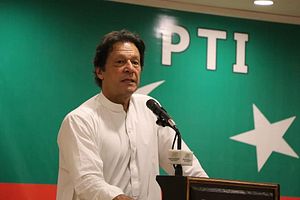Pakistan’s prime minister offered Tuesday to hold talks with India, even as he warned New Delhi to refrain from launching any attacks on his country following last week’s suicide bombing in Indian-controlled Kashmir.
Imran Khan said he hoped “better sense” would prevail after the attack that killed at least 40 Indian troops. But he warned in a televised speech that if India attacks, “Pakistan will not merely think of retaliation, but rather, we will retaliate.”
India has blamed Pakistan and threatened a “jaw-breaking response” for last Thursday’s bombing, in which a militant rammed an explosive-laden van into a paramilitary bus in Kashmir. It was the worst attack against Indian government forces in Kashmir’s history.
Tensions between the nuclear-armed rivals soared following the attack. Islamabad condemned it while also cautioning India against linking Pakistan to the bombing without an investigation. On Monday, four Indian soldiers, three suspected militants, a police official, and a civilian were killed as Indian soldiers searched for militants.
“If you have any actionable evidence, share it with us and we will take action,” Khan said. “We are ready to cooperate with India in the investigations.”
“I hope better sense will prevail,” he added.
His remarks were in response to Indian Prime Minister Narendra Modi’s announcement that his security forces have been given “total freedom” to deal with the militants in Kashmir. In 2016, in response to an attack on Indian forces based near Uri, India conducted “surgical strikes” against what it claimed where militant strongholds in Pakistan-controlled Kashmir.
India’s Ministry of External Affairs said in a statement it was surprised that Khan “refuses to acknowledge the attack on our security forces in Pulwama as an act of terrorism” and that the Pakistani premier “has neither chosen to condemn this heinous act, nor condoled with the bereaved families.”
It said Khan ignored claims made by Jaish-e-Mohammed, as well as by the assailant who perpetrated the crime. Jaish-e-Mohammed, which claimed responsibility for the attack last week, is outlawed in Pakistan but thought to operate from safe havens there.
“It is a well-known fact that Jaish-e-Mohammed and its leader Masood Azhar are based in Pakistan. These should be sufficient proof for Pakistan to take action,” the MEA said.
It said Khan sought evidence from New Delhi, which was “a lame excuse” as India had given evidence to Islamabad following the Mumbai attacks and “despite this, the case has not progressed for the last more than 10 years.”
“Pakistan claims to be the greatest victim of terrorism. This is far from the truth. The international community is well acquainted with the reality that Pakistan is the nerve center of terrorism,” the MEA said.
India and Pakistan each administer a part of Kashmir, but both claim the Himalayan territory in its entirety. They have fought two of their three wars over it. Rebels in the region have been fighting Indian rule since 1989, demanding that Kashmir be united under Pakistani rule or granted independence.
Earlier on Tuesday, Pakistan said it recalled its ambassador from India after New Delhi recalled its own envoy. Pakistan called on the United Nations to help defuse tensions.
Pakistan’s Foreign Minister Shah Mahmood Qureshi sent a letter to UN Secretary-General Antonio Guterres alleging that “for domestic political reasons, India has deliberately ratcheted up its hostile rhetoric against Pakistan and created a tense environment.”
India’s Ministry of External Affairs said it had no comment on Pakistan’s letter to the UN.
A senior Indian military official in Kashmir, Lt. Gen. K.J.S. Dhillon, on Tuesday told reporters that Indian forces killed the chief of the JeM militant group behind Monday’s gunbattle and last week’s suicide bombing.
The leader was a Pakistani national by the name of Kamran, Dhillon said.
Pakistan did not immediately comment on Dhillon’s remarks.
By Munir Ahmed for The Associated Press. Associated Press writers Ashok Sharma in New Delhi and Aijaz Hussain in Srinagar, India, as well as The Diplomat staff, contributed to this report.
































